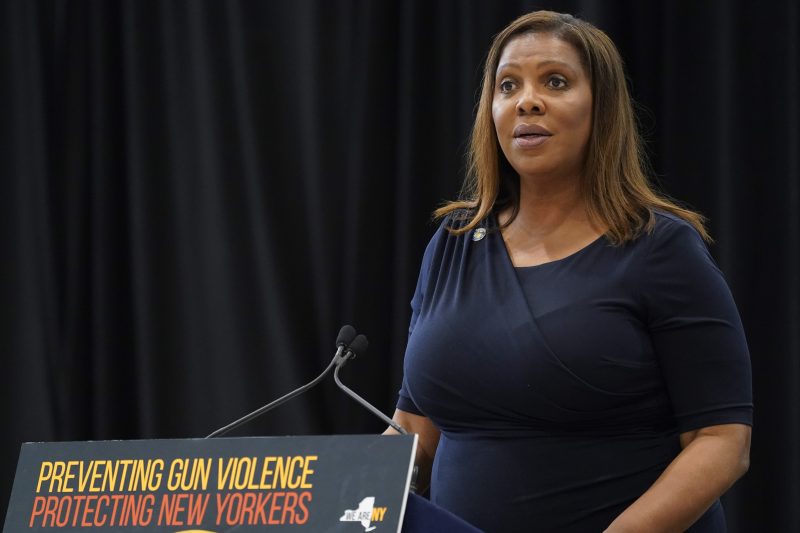Former president Donald Trump withdrew a lawsuit Friday against New York Attorney General Letitia James (D) that had sought to shield his revocable trust from James, who is pursuing a $250 million civil suit against Trump over a decade’s worth of allegedly fraudulent business practices.
“Plaintiff, PRESIDENT DONALD J. TRUMP, by and through his undersigned counsel and pursuant to Fed. R. Civ. P. 41(a)(1)(A)(i), hereby voluntarily dismisses his claims in this action against Defendant, LETITIA JAMES, without prejudice,” said the one-page document filed in the U.S. District Court for the Southern District of Florida.
The action came a day after news broke that U.S. District Judge Donald M. Middlebrooks had fined Trump and his lawyer, Alina Habba, almost $1 million for what was ruled a frivolous lawsuit brought against his 2016 presidential rival Hillary Clinton and others.
In his 46-page judgment, Middlebrooks cited the lawsuit against James as among those that demonstrated “a pattern of abuse of the courts” by Trump.
Earlier this month, a judge ruled that James’s $250 million lawsuit against Trump will go forward, calling arguments by Trump’s team “frivolous.”
At issue is a lawsuit that James filed in September against Trump; three of his adult children who have been company executives; his longtime chief financial officer Allen Weisselberg; and the company after a multiyear investigation. New York Supreme Court Justice Arthur Engoron has set an October trial date for the major civil case to be heard.
The lawsuit, which could effectively cripple the Trump Organization’s ability to do business in New York, accuses the family-run real estate, golf resort and hospitality business of purposely deceiving lenders, insurance brokers and tax agencies to get preferable loan rates and reduce its tax liability by using bogus asset valuation figures from 2011 to 2021.
The Trump lawsuit that was withdrawn in Florida had charged that James has “repeatedly abused her position as Attorney General for the State of New York to pursue a vendetta against President Trump.”
Trump had made similar claims against James in state and federal court in New York.
Last May, a federal judge in Syracuse, N.Y., dismissed Trump’s lawsuit against James — which claimed that her long-term civil investigation into his business practices was an abuse of authority that needed to be stopped.
The former president’s attempt to halt James’s probe into the Trump Organization and its dealings with lenders and tax authorities was rejected in a 43-page decision by U.S. District Judge Brenda K. Sannes.
In a statement, James said her office would “continue this investigation undeterred,” suggesting that Trump has made efforts to “choose how the law” applies to him.
Middlebrooks, in his judgment published late Thursday, wrote that Trump is a “prolific and sophisticated litigant who is repeatedly using the courts to seek revenge on political adversaries.”
“He is the mastermind of strategic abuse of the judicial process, and he cannot be seen as a litigant blindly following the advice of a lawyer. He knew full well the impact of his actions,” said Middlebrooks. “As such, I find that sanctions should be imposed upon Mr. Trump and his lead counsel, Ms. Habba.”
Trump — who has announced his bid for the presidency in 2024 — Habba, and the Habba Madaio & Associates law firm are jointly liable for $937,989.39, the court found.
Representatives for Trump and Habba did not immediately respond to an overnight request for comment from The Washington Post.
The suit was filed in March 2022, with Trump alleging that Clinton and others had orchestrated “a malicious conspiracy” to spread false information that his campaign had colluded with Russia during the 2016 presidential race that he won.
It was dismissed in September by Middlebrooks, who said there were “substantive defects” in the case and grievances for which a court was “not the appropriate forum.”
Shayna Jacobs in New York contributed to this report.








